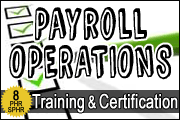Compliance Requirements For Payroll Department Operations
Payroll Operations Defined
Payroll operations refer to the processes and activities involved in managing the payment of employees within an organization. These operations typically include tasks such as calculating wages, deducting taxes and other withholdings, distributing paychecks or direct deposits, and maintaining accurate records of employee compensation.
What Are The Key Elements To Handling Payroll Operations?

Handling payroll operations involves several key elements to ensure accuracy, compliance, and efficiency. Here are the key components:
- Employee Information Management:
Maintain accurate records for all employees, including personal details, employment status, tax withholding information, salary or wages, benefits, and any other relevant information. - Time Tracking:
Implement a system for accurately tracking employee work hours, whether through manual timesheets, time clock software, or other methods. This information is crucial for calculating wages and ensuring compliance with labor laws. - Calculation of Gross Wages:
Calculate employee wages or salaries based on their hours worked, pay rate, overtime hours (if applicable), bonuses, commissions, and any other earnings. - Deductions and Withholdings:
Deduct applicable taxes (federal, state, and local), social security contributions, Medicare contributions, as well as any other deductions such as health insurance premiums, retirement contributions, or garnishments. - Ensuring The Accurate Calculation And Timely Remittance Of Payroll Taxes
- Compliance:
Stay up-to-date with federal, state, and local labor laws, tax regulations, and reporting requirements to ensure compliance. This includes minimum wage laws, overtime regulations, tax filing deadlines, and other legal obligations. - Recordkeeping:
Maintain thorough and accurate records of payroll transactions, employee earnings, tax withholdings, and other relevant information. These records should be kept for a specified period as required by law. - Reporting:
Generate and file required payroll reports, such as quarterly and annual tax filings (e.g., Form 941, Form W-2), as well as any other reports required by regulatory agencies or internal stakeholders. - Auditing and Reconciliation:
Conduct periodic audits of payroll records to ensure accuracy and identify any discrepancies. Reconcile payroll accounts with financial records to ensure that all transactions are accounted for correctly. - Communication and Support:
Provide support and assistance to employees regarding payroll-related inquiries, such as pay stubs, tax forms, or changes in payroll policies.
What Are The Most Common Errors Of Payroll Operations Administration?
Payroll operations administration involves a multitude of tasks, and errors can occur at various stages. Here are some of the most common errors encountered in payroll operations administration:
- Incorrect classification of employees

- Manual calculation errors
- Failure to update payroll tax rates
- Overtime calculation errors
- Failure to deduct pre-tax contributions
- Mishandling garnishments
- Not Accounting for leaves and absences
- Not knowing or follow the rules for multi-state taxation
- Missed deadlines for payroll processing, tax filings, and other regulatory requirements
Key Issues With Payroll Operations
Employers must make sure that they know the requirements and have proper procedures for:
- Applicable software programs
- Direct deposit
- Auditing their payroll systems
- Meeting reporting requirement deadlines
- Record retention
By effectively managing these key elements, organizations can ensure smooth and accurate payroll operations while complying with legal requirements and meeting the needs of employees.
To mitigate errors and ensure compliance, it's essential for payroll administrators to implement robust processes, utilize reliable payroll software, stay updated on regulatory changes, and conduct regular audits to ensure accuracy and compliance. Additionally, ongoing training for payroll staff can help prevent common errors and improve overall payroll administration efficiency.



